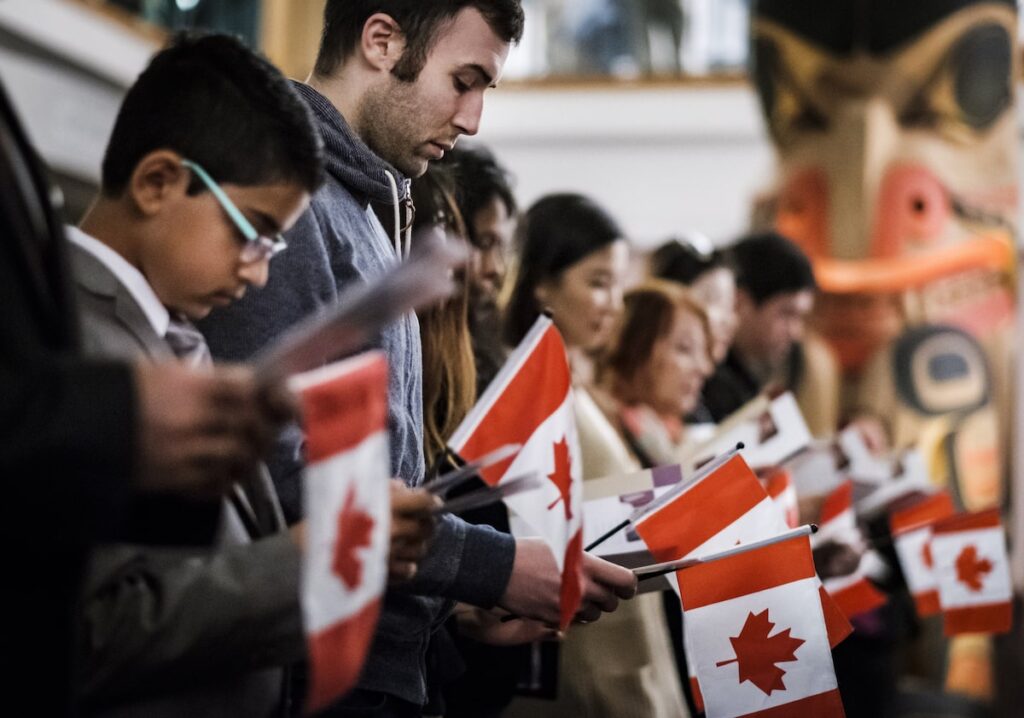Open this photo in gallery:
Canadian citizenship ceremony at the Bill Reid Gallery in Vancouver on June 21, 2016. John Lehmann/John Lehmann/The Globe and Mail
Ajay Virmani is the founder and chairman of Cargojet. This article is an excerpt from a talk he recently gave at the Canadian Museum of Immigration event at Pier 21 titled “Charming Canadians.”
When I came to Canada in November 1975, my first job was washing windows in Toronto.
I was paid $3 an hour and started work on the 54th floor of the Toronto Dominion Bank Tower. It was freezing, I had no warm clothes, no training, the harness was awful and it made me dizzy.
My Canadian dream was reflected in every window I washed.
At the end of the first day, I earned $42, a huge amount for someone who had come to this country from India with only $8 in his pocket. It was more than double what my parents, an army officer and a teacher, had earned in a month in India together.
That day, I knew the Canadian dream was worth striving for.
I took many twists and turns to achieve my dream. I sold vacuum cleaners and life insurance door to door, assembled speakers and Midas mufflers for rock bands, then found my true calling at a logistics company. I started in a low-level job collecting money from creditors, then got an MBA to better my future.
In 2001, I invested in Canada's second largest airline, Canada 3000. The company filed for creditor protection after 9/11 and renamed itself Cargojet. It was a bold move; at least 14 domestic cargo airlines had gone bankrupt. But I also understood that a country this large needed reliable air transportation.
We started with one aircraft. Today, Cargojet is Canada's largest cargo service, flying to over 16 Canadian cities and multiple international destinations every night. We have approximately 2,000 team members and a fleet of 44 Boeing aircraft.
Is the dream still possible for a Canadian like me?
On the surface, the journey has become easier. Many of the barriers to immigration that existed in the 1970s, including mild racism, have disappeared. Today, Canada is a diverse country.
Unfortunately, the economic situation for immigrants today is much tougher than it was in 1975. And the underlying social frameworks – education, health care systems – are also different.
We need to recognize that this country was built by immigrants, and Canada still needs immigrants – skilled, investing people – to continue to prosper and grow.
Our strong passport should make this country a top attraction for first-class immigrants, but many who come here in search of the Canadian dream leave frustrated, depressed and disillusioned by the lack of opportunity.
The Canadian Citizenship Institute recently released a report called “The Leaky Bucket,” which found that “onward migration” (a fancy way of saying immigrants leaving their country) is up 31 percent from historical levels.
As we compete globally for skilled immigrants, we need to be more competitive – for example, to quickly hire the more than 7,000 qualified doctors currently working as taxi and truck drivers, so we can fill our health care worker shortage.
We need to revive the dream of home ownership for young Canadians. We also need to address the issue of rising prices and food costs. Did you know that a quarter of food bank users in Canada are new immigrants?
Education and health care standards need to be restored. Regulatory hurdles need to be relaxed. And economic incentives need to be put in place that reward success.
There are now more than two million temporary immigrants in this country. They are accused of straining our resources. Support for immigration, once the bedrock of multicultural Canada, is weakening. Today, 41 per cent of Canadians believe there are too many immigrants coming to this country.
To reverse this negative perception and restore trust in immigrants, highlighting their evidence-based contributions through effective communication is crucial.
We all have a role to play in fostering a welcoming and inclusive society, and if you're wondering what you can do as an individual, here are some modest suggestions:
Help new immigrants. Go out of your way to help them. It's not easy to adapt to a new country and a new culture. Help them get their qualifications faster. Show them how warm Canada is despite the harsh winters.
Because the truth is that every person who has helped me along the way has a direct impact on the 2,000+ jobs and families my company supports today — all because of one immigrant from New Delhi making the Canadian dream come true.



